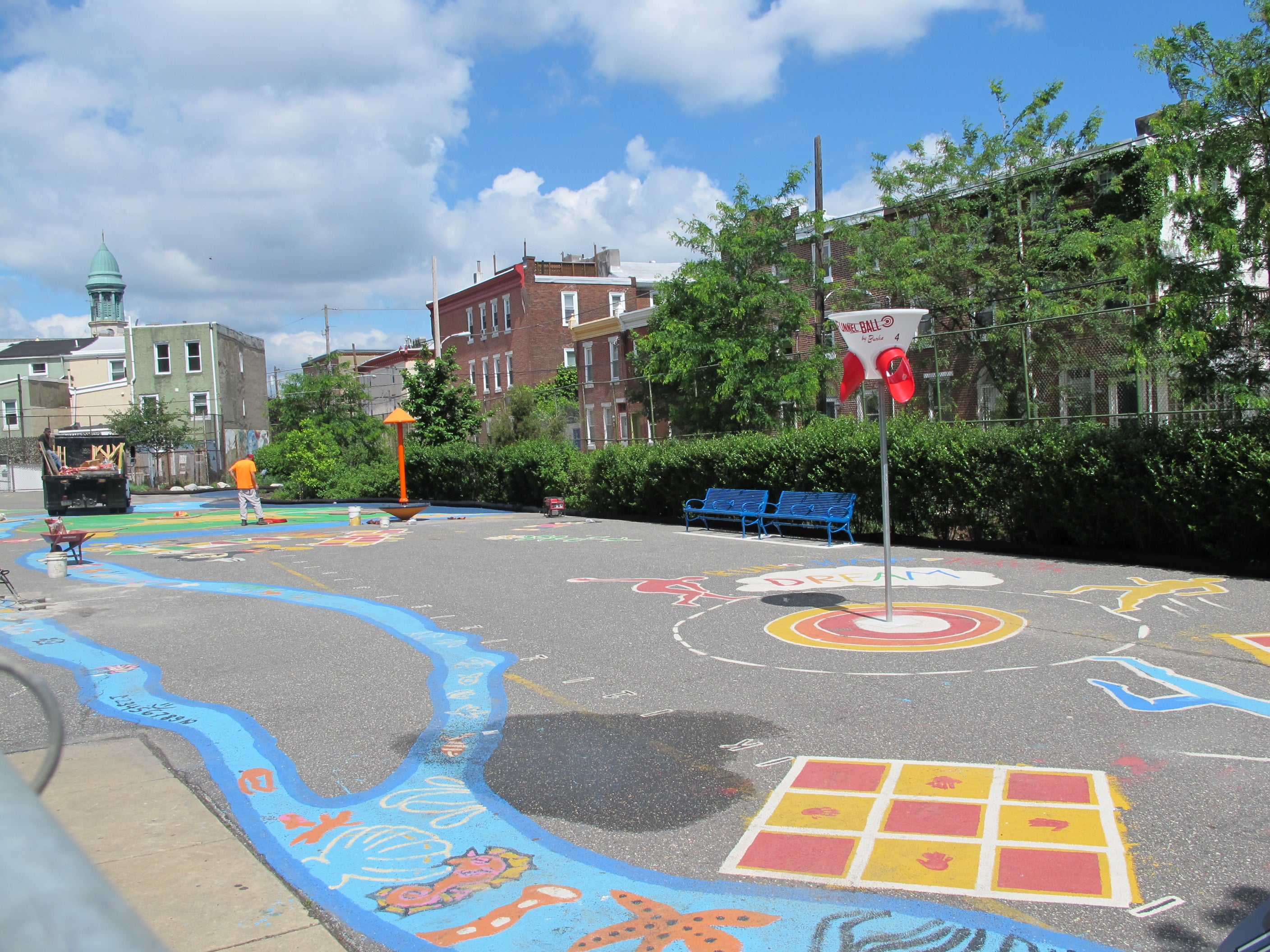Bedlam over basketball and extended hours at Nebinger Elementary’s schoolyard

Thursday night’s assembly about renovations of the schoolyard at George W. Nebinger Elementary School in Queen Village proves that any community meeting in Philadelphia, no matter the topic, can easily become a battle royale.
The forum, attended by First District Councilman Mark Squilla, turned contentious as neighbors exchanged acrimonious words and shouted insults. One confrontation over who would ensure that the playground is locked at night nearly provoked the intervention of a police officer.
“Please, please if everyone keeps interrupting each other and shouting nothing will ever get done,” pleaded Squilla early in the meeting. The crowd did not heed his words.
Despite Squilla’s attempted interventions, the councilman, Danielle Floyd of the School District of Philadelphia, and Gretchen Trefny of Parks for People, mostly sat silently on stage while speakers raged at one another on the floor below. The small children who scurried about the crowded auditorium intensified the madhouse atmosphere.
At the heart of the confrontation is the green schoolyard that a shifting group of stakeholders—ranging from the School District and the Water Department to neighborhood groups and numerous non-profits—have been planning for more than six years.
In 2013 and 2014, the Water Department funded stormwater management upgrades. Now the Trust for Public Land is handling the construction of a renovated playground featuring an outdoor classroom, a metallophone musical instrument, a net climber, and a basketball court.
A handful of near neighbors, especially those whose properties abut the playground, say they only learned of the project in the last month. At the meeting, representatives of this faction fretted about security risks if the schoolyard, as planned, is opened to the public after school hours. There were also denunciations of the planned basketball hoop, which some argued would be a nuisance at night because it is separated from their homes only by a chain link fence.
“The very first time any of us heard about this was from a note the day before construction began,” said Nicole Paloux, a neighbor whose backyard runs up against the playground.
Although the rejuvenation of the playground has been the subject of numerous articles in a variety of newsletters and publications—including the South Philly Review, Philadelphia Magazine, and the Philadelphia Citizen—Paloux and other neighbors don’t understand why they weren’t informed.
A lawyer representing the oppositional neighbors, Jonathan Grosser of the high-powered Stradley Ronon law firm, claimed the school needs a variance to proceed because the updated playground constitutes a change of use, which would require a zoning variance. Floyd of the school district was dismissive of the idea.
Paloux insisted that she didn’t oppose enhancements to the playground—at which a voice cried, “Why are we all here then?”—but she did pass around a study about the dangers of public parks. Titled “The role of neighborhood parks as crime generators,” it contains Philadelphia-based research that finds parks to be associated with heightened crime. (The abstract does note, however, “specific characteristics of parks are associated with lower crime levels.”)
“A chain link fence is the only thing that separates my garden, a space that I cherish dearly, and my piece of real estate, and my privacy, and my safety from the playground,” said Paloux.
As the study circulated through the audience, passions became further inflamed.
“For every study you show us that says parks create crime, I can show you ten that show the exact opposite,” said Joan Maya Mazelis, a Rutgers professor of sociology who studies urban poverty. Other Philadelphia based studies have demonstrated that well-maintained green spaces deter crime.
The majority of attendees seemed supportive of the proposal and was irked to even have to defend it.
“When you tell a child you are going to do something, you should follow through,” said Danielle Byrd, a resident of Southwest Philadelphia whose 5th grader has attended Nebinger since kindergarten. “I recognize people have valid concerns about activities surrounding their homes, but why are we associating a playground and a park as something negative?”
In Squilla’s telling, the controversy is all the result of the fact that planning and construction took place over six years and involved multiple stakeholder groups. Numerous community engagement events were held over at Nebinger earlier in the process, but that was over half a decade ago.
“I take responsibility for that and people can blame me for not contacting everybody,” said Squilla. “We have to give the near neighbors respect and everyone needs to have their voices heard. But at the end of the day, the playground will get done.”
Although construction temporarily halted on the project, on Thursday night Squilla told PlanPhilly that construction would begin again on Friday, and crews were on site in the morning. Trefny of Parks for People—a collaborative program of the Trust for Public Land and the City of Philadelphia—assured the crowd that the delay would not result in lost taxpayer dollars. A similar project is underway at the Alexander Adaire School in Fishtown and the workers and materials were just shifted there.
The meeting concluded with little resolution, other than a promise of further discussion with the near neighbors and other community members about how late the park will remain open at night. Afterwards, Squilla said that the basketball court would be moved from the fence facing the houses fronting Passyunk Avenue to the fence facing the playground. (Paloux’s husband, Charles, demanded a brick wall instead.)
As the attendees streamed out, they periodically exchanged barbed words about the quality of their respective schools, neighborhood associations, and personal characters. The meeting succeeded in allowing voices to be heard, if little else.
WHYY is your source for fact-based, in-depth journalism and information. As a nonprofit organization, we rely on financial support from readers like you. Please give today.




